Media
Resources
Current
- Dr. Karin H. James' Google Scholar:
Spring 2019 
- Dr. James featured in an article for her work on MRI tablet and funding received from a Johnson Center grant.
Fall 2018
- Dr. James discusses how the brain changes when children learn to write.
- Dr. James discusses the importance of handwriting for creativity and productivity in the workplace in the August 6th, 2018 issue of Bloomberg Buisnessweek.
Fall 2017
- CANLab handwriting research featured in two BBC articles in Fall of 2017.
- BBC Future: The uncertain future of handwriting
- BBC News: Do we need to teach children joined-up handwriting?

Summer 2017
- Dr. James and CANLab graduate student Sophia Vinci-Booher worked with PBS engineers and technicians, our “basement wizards” to create the first ever MRI-safe digital tablet.
- As a result of this three-year collaboration, they and the university have been awarded a “provisional patent” by the U.S. Patent Office.
Spring 2017
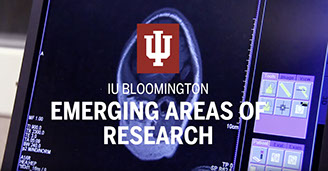
- Dr. Karin James is part of an interdisciplinary team of cognitive scientists, neuroscientists and computer scientists who received Indiana University's inaugural Emerging Areas of Research funding award. The research team will receive up to $3 million for the four-year project.
- Called "Learning: Machines, Brains & Children" the proposed research would focus on a unified and algorithmic understanding of human learning and its neural mechanisms and in the extension of these insights to machine learning.
Fall 2016
- Dr. James' handwriting research was featured in an article in Community Health entitled "Why your kids should learn to write by hand"
- CANLab research was cited in a handwriting retrospective in Mother Jones Magazine.
Summer 2016
- Read about Dr. James' handwriting research in this NY Times "Well" blog entry entitled "Why Handwriting is Still Essential in the Keyboard age."
- A version of this article appeared on page D6 of the NY Times New York edition on June 6, 2016 with the headline, "Writing to Learn."
Summer 2015

Does handwriting have a future? Dr. James was a guest on Australian National Radio's, Austrailian Broadcasting Corporation (ABC), popular current events program, Future Tense to discuss the future of handwriting in education.
- Please visit fold, Radio Broadcasts, to listen to the radio program
- “James and Engelhardt found that writing is particularly instrumental in the cognitive development of pre-literate 5 year olds. The kids, who were learning the alphabet, wrote, traced, and typed letters. MRI scans found that the kids who had written letters were able to perceive the letters better, helping them to read at better rates compared to the typers and tracers."
Read more in a TIME magazine interview with Dr. James: "Are There Really Benefits to Writing Things by Hand?”
Spring 2015
“Should Kids Learn Handwriting? An IU Scientist Thinks So.” Read Dr. James' interview in the Feb/March issue of Bloom Magazine.
Fall 2014
- Dr. James' research on the relationship between writing and letter recognition is featured in a November, New Scientist, article: "The Writing's on the Screen."
- Dr. Karin James discusses how handwriting affects kids' brain development on Sound Medicine, Public Radio's Weekly Magazine About Medicine and Health.
- Dr. James' research on writing was featured in Parade Magazine
Summer 2014
"Does handwriting matter?" Dr. Karin James' research was part of a New York Times feature on the effects of the diminished emphasis on teaching handwriting skills to school children.
Dr. James' handwriting research is highlighted in t
 he IU Newsroom Fall 2014 Back-to-School issue
he IU Newsroom Fall 2014 Back-to-School issue
“We have recently shown that when children look at letters, the activity in parts of their brains becomes more like activity seen in literate adults, but only after they have had practice printing letters.”
Fall 2012
Drs. Tom & Karin James' collaborative "Pokemon" research is discussed in an IU Newsroom release:
"Pokemon has since provided a rich testing ground for a theory of facial cognition that until now has been difficult to support. With the use of cutting-edge neuroimaging, the study challenges the prevailing theory of face recognition by offering new evidence for a theory that face recognition depends on a generalized system for recognizing objects, rather than a special area of the brain just for this function."
Spring 2012
- "IU neuroscientist Karin Harman James to discuss research with Indiana senators"
During the 2012 Handwriting in the 21st Century Educational Summit in Washington, DC, Dr. James presented the results of a series of studies using functional Magnetic Resonance Imaging (fMRI) that suggest that self-generated action, in the form of printing letters by hand, is a crucial component in setting up brain systems for reading acquisition.
Dr. James discusses the importance of handwriting in child development on Fox News network affiliate in Washington DC while attending the 2012 Handwriting in the 21st Century Educational Summit in Washington, DC.
Fall 2011
Dr. James was interviewed for a feature entitled "Why Schools Should Keep Teaching Handwriting, Even If Typing Is More Useful" The feature was in STATEIMPACT INDIANA, a collaboration of WFIU and Indiana Public Broadcasting stations whose objective is to explain the effects of state education policy on people's lives.
Summer 2011
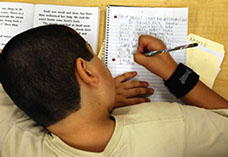
"For children, handwriting is extremely important. Not how well they do it, but that they do it and practice it...", said Karin Harman James, an assistant professor in the department of psychological and brain sciences at Indiana University. She concludes,"...typing does not do the same thing."
Fall 2010
“It seems there issomething really important about manually manipulating and drawing out two-dimensional things we see all the time," says Dr. Karin Harman James. A CANLab study is used to illustrate the benefits of handwriting in the Wall Street Journal article "Handwriting Trains the Brain."
Dr. James’ handwriting research was featured in the Indiana University 2010 Annual Report.
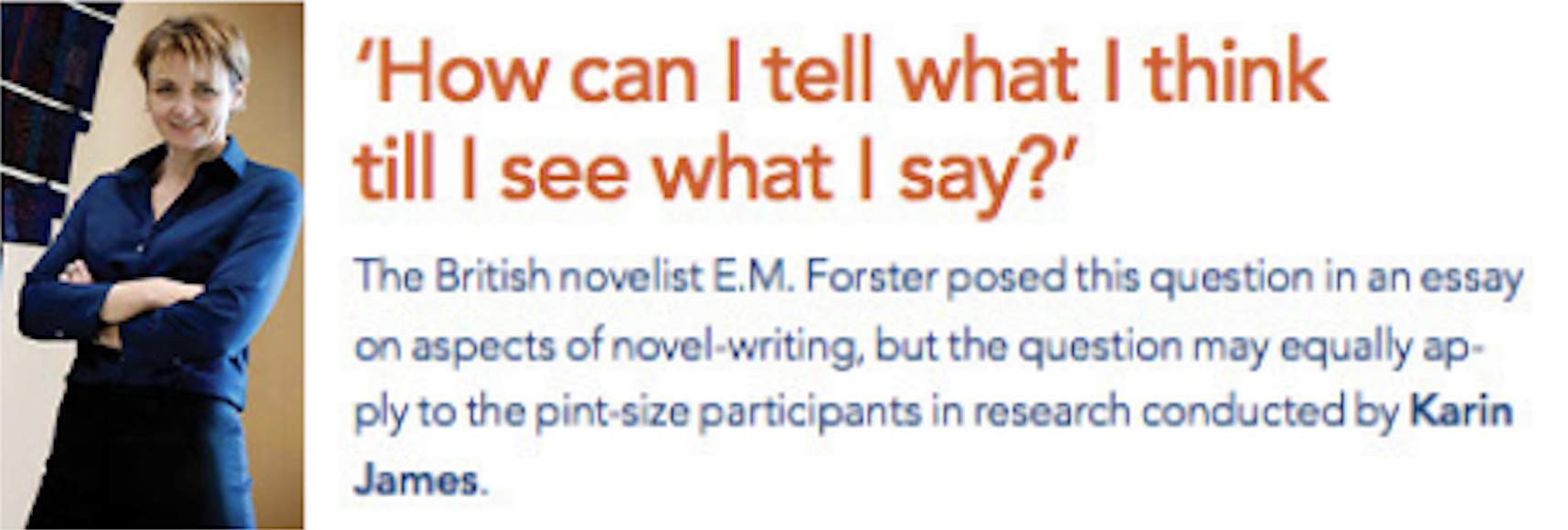
2019
- Research Equipment Fund Award: Pupil Labs head mounted eye tracker
- Federation of Associations in Behavioral and Brain Sciences (FABBS) 2019 Doctoral Dissertation Award: Sophia Vinci-Booher
- JR Kantor Award - Outstanding graduate student: Sophia Vinci-Booher
- Student Poster Contest, 2nd place at 2019 Center for Women in Technology Conference: Justine Izah & Maya Lee
2018
- Program in Neuroscience Travel Award: Sophia Vinci-Booher
- Indiana University Provost's Travel Award for Women in Science: Sophia Vinci-Booher
2017
- Neuroscience Travel Award: Sophia Vinci-Booher
- Indiana University Provost's Travel Award for Women in Science: Sophia Vinci-Booher
- Groups STEM Summer Research Experience, Indiana University: Sophia Vinci-Booher
- Support Scholarship to the NSF-funded Big Data Neurosciences Workshop 2017: Sophia Vinci-Booher.
- Dr. Karin H. James was awarded Indiana University Trustee Teaching Award in 2017
 Dr. Karin James is part of an interdisciplinary team of cognitive scientists, neuroscientists and computer scientists who received Indiana University's inaugural Emerging Areas of Research funding award. The research team will receive up to $3 million for the four-year project.
Dr. Karin James is part of an interdisciplinary team of cognitive scientists, neuroscientists and computer scientists who received Indiana University's inaugural Emerging Areas of Research funding award. The research team will receive up to $3 million for the four-year project.
- Called "Learning: Machines, Brains & Children," the proposed research would focus on a unified and algorithmic understanding of human learning and its neural mechanisms and in the extension of these insights to machine learning.
2016
- James S. McDonnell Foundation Fellowship to attend the 6th Latin American School for Education, Cognitive and Neural
- Sciences (LA School), Buenos Aires, Argentina: Sophia Vinci-Booher & Felipe Munoz
- Fellowship for the The Kavli Summer Institute in Cognitive Neuroscience, University of California-Davis & University of California-Santa Barbara: Sophia Vinci-Booher & Felipe Munoz
- PNS/COAS Travel award to attend the the Vision Science Society annual meeting in St. Petersburg, Florida: Sophia Vinci-Booher.
2015
- Fellowship for the 2015 Summer Institute in Cognitive Neuroscience, University of California-Davis & University of California- Santa Barbara: Felipe Munoz
- Developmental Training Grant recipient from the National Institute of Health through Indiana University [Grant Number: 2 T32 HD007475-21] (2015-2016): Sophia Vinci-Booher
2014
- Pilot Grant for an fMRI study, Imaging Research Facility, Indiana University Project: Neural Modulation as a Function of Word Meaning: Felipe Munoz
- IU's Provost's Travel Award for Women in Science: Elizabeth Wakefield
- NSF IGERT Travel Award: Joanne Jao
- National Institute of Health Developmental Training Grant [Grant Number: 5 T32 HD 7475-20] (2014-2015): Sophia Vinci-Booher
2013
- Center of Excellence for Women in Technology Conference, Graduate student poster winner: Sophia Vinci-Booher
- IU Excellence in Research award: Arianna Gutierrez
- J.R. Kantor award for outstanding honors thesis: Alyssa Kersey
2012
- IU Imaging Research Facility Pilot Grant for Learning about mathematical equivalence through active or passive experience: K. James, E. Wakefield, & S. Goldin-Meadow
- Provost Travel Award for Women in Science to attend the 13th annual meeting of the Vision Sciences Society: Joanne Jao and Sandra Street
2011 & Older
- Fulbright & Conicyt Scholarship for Doctoral Studies (4 years): Felipe Munoz
- Outstanding Graduate Student Instructor Award: Elizabeth Wakefield
- National Science Foundation Graduate Research Fellowship Program: Honorable Mention: Joanne Jao
- Service-Learning Graduate Fellowship: Elizabeth Wakefield
- J.R. Kantor Award for excellence in graduate research: Elizabeth Wakefield
- Science, Technology, and Research Scholars (STARS) Summer Scholarship to complete research on the neural correlates of handwriting in children: Alyssa Kersey
- Graduate student summer fellowships: Julia Li and Joanne Jao
- NSF IGERT Training Grant:Joanne Jao
- Women in Science Research Conference, Social Science Poster Winner: Laura Englehardt
- J.R. Kantor Award, the highest award given to IU psychology undergraduates: Laura Engelhardt
- Laura Engelhardt accepted to UCSD undergraduate research conference
- Outstanding Associate Instructor for Methods of Experimental Psychology: Elizabeth Wakefield
- Outstanding undergraduate honors thesis award: Laura Englehardt
- Commendation on Doctoral Qualifying Exams: Elizabeth Wakefield
- National Science Foundation Graduate Research Fellowship (Honorable Mention): Elizabeth Wakefield
- NIH Developmental Training Grant: Joanne Jao
- IU Graduate Women In Science Award: Joanne Jao
- Full Stipend Travel Award, International Society for Gesture Studies Summer Program: Elizabeth Wakefield
- Science, Technology, and Research Scholar (STARS): Alyssa Kersey
- Graduate Student Present (GSP) award from the Cognitive Neuroscience Society: Andrew Butler
- Student Presentation Travel Award, Society for Music Perception and Cognition: Elizabeth Wakefield
- Edward L. Hutton International Experience Program Scholarship: Alyssa Kersey
- Hutton Honors College Merit Scholarship: Alyssa Kersey
- Indiana University Cox Research Scholarship: Laura Englehardt
- Howard Hughes Medical Institute Undergraduate Capstone award: Thea Atwood, Scott Mueller & Alexander Foss
- Hutton Honors College Fellowship: Alexander Foss
Indiana University Science Fest
The IU College of Arts and Sciences hosts an annual IU Science Fest at IU Bloomington's beautiful campus. Children can participate in 150+ hands-on activities, demonstrations, and talks, representing 20 departments and disciplines, from physics to psychology. The CAN Lab hosts a variety of hands-on brain science activities for kids at this large community event.
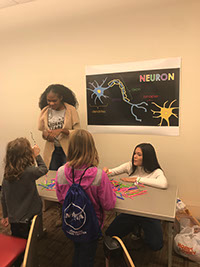
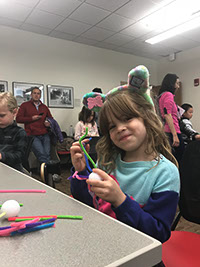
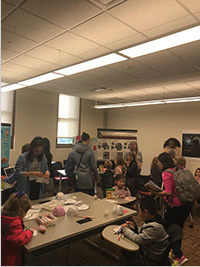
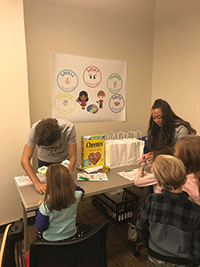
Child-Scientist Activity Week (C-SAW)
In the summer, the Department of Psychological and Brain Sciences' Developmental Labs open their doors to young children in the Bloomington community to introduce them to the wonders of the brain. During this Child-Scientist Activity Week (C-SAW), IU psychology researchers and students engage children in games, crafts, and demonstrations to explore the senses, memory, emotions, coordination and other aspects of their growing, changing brains. Children attending C-SAW also participate in innovative psychological research being conducted in the department.
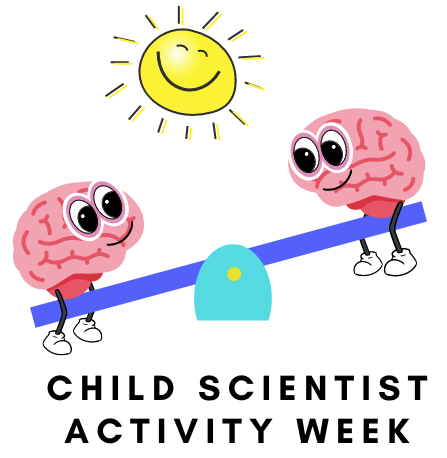
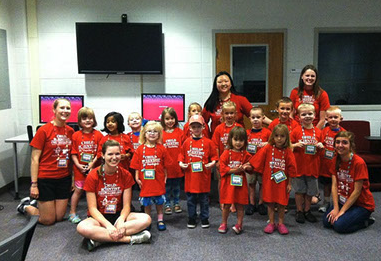

LabTV
Two graduate students in the lab, Felipe Munoz and Sophia Vinci-Booher participated in the launch of a project called LabTV. Sponsored by TedMed, Google and the National Institutes of Health, LabTV is a web-based video channel which features profiles of scientists at more than 60 leading research institutions who are passionate about their work. The aim is to inspire young students, especially minorities and women to pursue research.
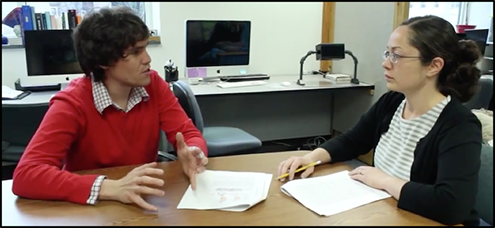
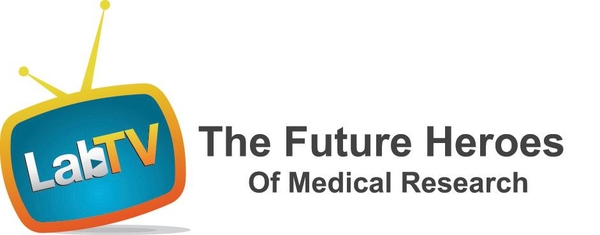
Elementary School Tours
As part of our initiative to educate the general public about the importance of research we host lab tours for elementary school students in the Bloomington community.
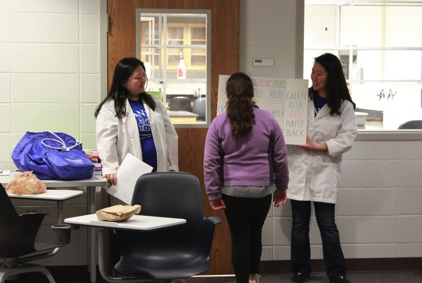
2019
- Vinci-Booher, S., James, K.H., & Pestilli, F. (2019, November). Brain Development from Sensorimotor Experiences. Oral presentation to be presented at the Brain and Mind Institute at the University of Western Ontario, ON, CA. (Invited talk.)
- Plebanek, D.J. & James, K.H. (2019, October). The neural underpinnings of variability in the development of category learning. Poster to be presented at the Cognitive Development Society Biennial Conference, Louisville, KY, USA.
- Vinci-Booher, S., Bullock, D., Caron, B., McPherson, B., James, K.H., & Pestilli, F. (2019, October). The relationship between the microstructure of vertical white matter pathways and behavior in early elementary school children. Poster to be presented at the Cognitive Development Society Biennial Conference, Louisville, KY, USA.
- James, K.H., & Vinci-Booher, S. (2019, May). Visual Experiences During Letter Production Contribute to the Development of the Neural Systems Supporting Letter Perception. In T. Schubert, Reading as a visual act: Recognition of visual letter symbols in the mind and brain. Symposium conducted at the Annual Meeting of the Vision Sciences Society, St. Pete Beach, FL, USA.
- Merritt, E. & James, K.H. (2019, April). Examining the influence of learning method on symbol recognition. Poster presented at the Center of Excellence for Women in Technology Conference, Bloomington, IN.
- Lee, M.E., Izah, J.C., Plebanek, D.J., & James, K.H. (2019, April). The influence of variability on neural underpinnings of categorization. Poster presented at the Center for Excellence for Women in Technology Conference, Bloomington, IN.
- Vinci-Booher, S., Nikoulina, A., James, T.W., & James K.H. (2019, March). Sensorimotor contingency leads to developmental changes in the neural mechanisms supporting visual recognition. Poster presented at the Cognitive Neuroscience Annual Meeting, San Fransisco, CA.
2018
- Vinci-Booher, S., Sehgal, N., & James, K.H. (2018, May). Visual and Motor Experiences of Handwriting Contribute to Gains in Visual Recognition. Poster presented at the Annual Meeting of the Vision Sciences Society, St. Pete Beach, FL.
- DelaCuesta, C., Vinci-Booher, S., & James, K.H. (2018, April). Poster presented at the Center of Excellence for Women in Technology Conference, Bloomington, IN.
- Harris, S., Vinci-Booher, S., & James, K.H. (2018, April). Handwriting Influence on Symbol Learning in Adults. Poster presented at the Center of Excellence for Women in Technology Conference, Bloomington, IN.
2017
- Vinci-Booher, S., & James, K.H. (2017, October). The development of the neural systems supporting handwriting and letter perception from kindergarten to adulthood. Poster presented at the Cognitive Development Society Bi-Ennial Conference, Portland, OR.
- Yearling, E., Vinci-Booher, S., & James, K.H. (2017, April). Investigating changes in functional connectivity between visual and motor systems after handwriting practice. Poster presented at the Center of Excellence for Women in Technology Conference, Bloomington, IN.
2016
- Vinci-Booher, S., Sehgal, N., Munoz-Rubke, F., & James, K.H. (2016, May). Perceptual and motor effects of letter writing on brain regions associated with letter perception. Poster presented at the Annual Meeting of the Vision Sciences Society, St. Pete Beach, FL.
- Vinci-Booher, S., Cheng, H., & James, K.H. (2016, March). Handwriting as a visually guided action: A developmental neuroimaging study. Poster presented at the Latin American School for Education, Cognitive, and Neural Sciences, Buenos Aires, Argentina.
- Zemlock, D., Vinci-Booher, S., & James, K.H. (2016, April). Learning about letters through handwriting practice . Poster to be presented at The National Conference on Undergraduate Research, Asheville, NC.
2015
- Frizell, T., Vinci-Booher, S., Zemlock, D., James, K.H., & Crandall, D.J. (2015, July). Exploring automated techniques for identifying and scoring children’s handwriting samples. Poster presented at the Summer Research Experience for Undergraduates Conference, Bloomington, IN.
- Sehgal, N., Vinci-Booher, S., & James, K.H. (2015, February ). The relationship between handedness and activation in the visual cortex of the brain. Poster p resented at the Center of Excellence for Women in Technology Conference, Bloomington, IN.
- James, K.H. (2015) .The development of neural systems that support letter perception: The importance of early handwriting. Psychonomics Society Annual Meeting, Chicago, IL.
- James, K.H. (2015). Only self-generated actions create sensori-motor networks in the developing brain. Society for Research in Child Development Annual Meeting, Philadelphia, PA.
- Munoz-Rubke, F., Kafadar, K., & James, K. H. (2015). Action is the key to observe the continuum among concrete and abstract words. Poster presented at the 2015 Cognitive Neuroscience Society (CNS) Annual Meeting, San Francisco, CA.
- Munoz-Rubke, F., Lynch, A., & Block H. J. (2015). Effect of visuo-proprioceptive realignment on motor cortex excitability. Poster presented at the 2015 Society for Neuroscience (SfN) Annual Meeting, Chicago, IL.
- Vinci-Booher, S., James, T.W., & James, K.H. (2015). The influence of visual-motor experiences on the development of brain mechanisms subserving letter perception. In E. Wakefield & M. Novack, Comparing the effects of active and passive learning experiences through action and gesture. Biennial Meeting of the Society for Research in Child Development, Philadelphia, PA.
- Vinci-Booher, S., Engelhardt, L., James, T.W., & James, K.H. (2015). Functional connections during letter perception reflect aspects of letter writing. Annual Meeting of the Cognitive Neuroscience Society, San Francisco, CA.
- Vinci-Booher, S., James, T.W., & James, K.H. (2015). Investigating functional connectivity in the developing brain using generalized psychophysiological interactions analysis. Biennial Meeting of the Society for Research in Child Development, Philadelphia, PA.
- Hall, C., Wakefield, E. M., James, K. H., & Goldin-Meadow, S. G. (2015). Learning verbs through action vs. gesture. Poster to be presented at the Cognitive Development Society 2015 meeting, Columbus, OH.
- Wakefield, E.M. Goldin-Meadow, S. & James, K.H. (2015). Can you show me yocking? Learning novel verbs through producing and observing actions and gestures. Society for Research in Child Development, Annual Meeting, Philadelphia, PA.
2014
- Vinci-Booher, S., Engelhardt, L., James, T.W., & James, K.H. (2014). Investigating the development of letter perception using gPPI connectivity analysis. Presented at the Center of Excellence for Women in Technology Conference, Bloomington, IN.
- Wakefield, E. M., Novack, M., Congdon, E., Goldin-Meadow, S., & James, K. H. (2014). Understanding the neural effects of learning with gesture: Does gesture help learners because it is grounded in action? Talk presented at the International Society of Gesture Studies meeting, San Diego, CA.
2013+
- Wakefield, E. M., & James, K. H. (2013). Behavioral and neural effects of learning with different gesture strategies. Poster presented at the Cognitive Development Society 2013 meeting, Memphis, TN.
- James, K. H., & Wakefield, E. M. (2013). Using fMRI with pre-school children to show brain changes associated with learning. Talk presented by Wakefield at the Cognitive Development Neuroscientific Approaches Symposium, Austin, TX.
- James, K.H. (2013). Using functional Magnetic Resonance Imaging techniques to probe learning mechanisms in young children. Cognitive Development Society Meeting, Memphis, TN.
- James, K.H. (2013). Manual actions on objects are driven by visual biases in 18-24-month-old children. Society for Research in Child Development Annual Meeting., Seattle, WA.
- Butler, A., Pavisian, B., & James, K.H. (2012). Neural differences in translating abstract versus concrete visual representations into actions. Cognitive Neuroscience Society, Chicago, IL.
- James, K.H., James, T.W., & Swain, S.N. (2012). The neural correlates of object expertise in the young child. Cognitive Neuroscience Society Annual Meeting, Chicago, IL.
- Wakefield, E. M., & James, K. H. (2012). Changes in iconic and metaphoric gesture processing across development. Talk presented at the International Society for Gesture Studies 2012 Meeting, Lund, Sweden.
- Wakefield, E. M., & James, K. H. 2012). Motor processing during gesture perception across development: An fMRI study. Poster presented at the Cognitive Neuroscience Society 2012 meeting, Chicago, IL.
- Yee, M. N., Smith, L.B., Jones, S. S., & James, K. (2012). How young children’s actions affect object recognition. Poster presented at the International Conference on Infant Studies. Minneapolis, MN
- Butler, A., Harman James, K. (2011). Active motor learning of audiovisual objects. Vision Sciences Society, Naples, FL.
- James, K.H. & Engelhardt, L. (2011). Visual object processing as a function of active experience in preschool children. Cognitive Development Society, Philadelphia, PA.
- James, K.H. & Kersey, A. (2011). Dorsal stream function in the 4-6 year old child: Assessing the neural correlates of the posting task using fMRI. Society for Research In Child Development. Montreal, QB, Canada
- Wakefield, E. M., & James, K. H. (2011). Neural correlates of gesture processing across development. Poster presented at the Cognitive Neuroscience Society 2011 meeting, San Francisco, CA.
- Butler, A., James, K. (2010). The recognition of actively vs. passively learned audiovisual associations. Cognitive Neuroscience Society, Montreal, QB, Canada
- James, K.H. (2010). The emergence of sensorimotor representations in the developing brain during language processing. Cognitive Neuroscience Society Annual Meeting, Montreal, QB, Canada
- Wakefield, E. M., & James, K. H. (2010). Sensori-motor integration in children: Effects of different forms of training on melody processing. Poster presented at the Cognitive Neuroscience Society 2010 meeting, Montreal, QB, Canada
IUB's fMRI facility is located at the IRF | The IRF houses a Siemens 3 Tesla Prisma MRI scanner, two Electrical Geodesics 64 channel EEG systems, a full-sized mock scanner, and a neuroimaging analysis lab with 8 workstations for EEG/ERP/neural source modeling and fMRI data analysis.
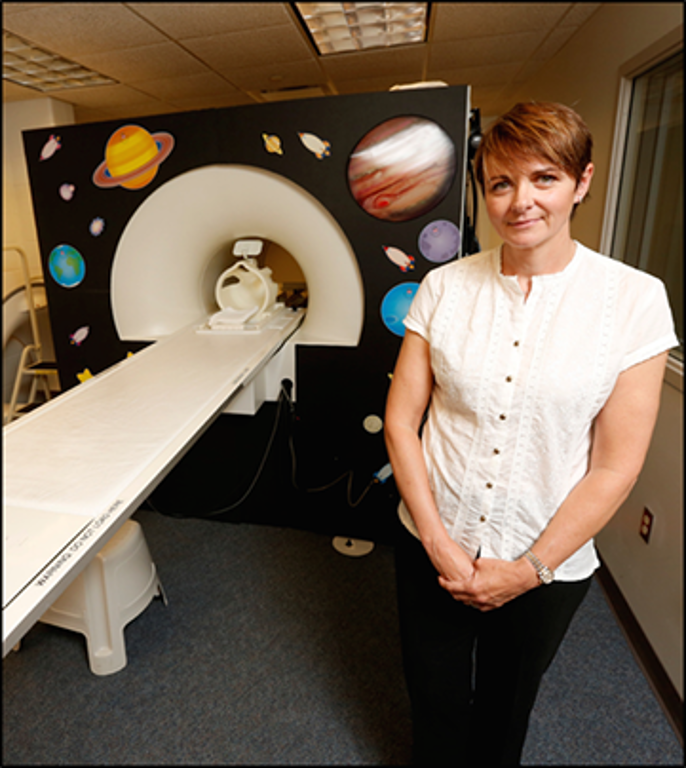
Imaging Research Facility (IRF)
Find all you need to know about IRF at Indiana University on their website:
Find more information about IRF at IUB's Psychological and Brain Sciences website:
Functional Magnetic Resonance Imaging (fMRI)
CAN Lab's "What is fMRI?" brochure:
Find more information about fMRI on their website:
Spring 2015
- “Should Kids Learn Handwriting? An IU Scientist Thinks So.” Read Dr. James' interview in the Feb/March issue of Bloom Magazine.
Learn more by listening to Dr. James' interview on the BBC News program, "The Forum"
Fall 2014
Dr. Karin James discusses how handwriting affects kids' brain development on Sound Medicine, Public Radio's Weekly Magazine About Medicine and Health.
Fall 2011
- Dr. James was interviewed for a feature entitled "Why Schools Should Keep Teaching Handwriting, Even If Typing Is More Useful" The feature was in STATEIMPACT INDIANA, a collaboration of WFIU and Indiana Public Broadcasting stations whose objective is to explain the effects of state education policy on people's lives.
Spring 2012
- During the 2012 Handwriting in the 21st Century Educational Summit in Washington, DC, Dr. James presented the results of a series of studies using functional Magnetic Resonance Imaging (fMRI) that suggest that self-generated action, in the form of printing letters by hand, is a crucial component in setting up brain systems for reading acquisition.
- Dr. James discusses the importance of handwriting in child development on Fox News network affiliate in Washington DC while attending the 2012 Handwriting in the 21st Century Educational Summit in Washington, DC.
Summer 2015
Does handwriting have a future? Dr. James was a guest on Australian National Radio's, Austrailian Broadcasting Coporation (ABC), popular current events program, Future Tense to discuss the future of handwriting in education.
Fall 2010
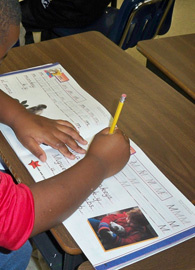
Listen to Dr. Karin H James on The Madeleine Brand Show talk about the importance of handwriting in a digital time.

